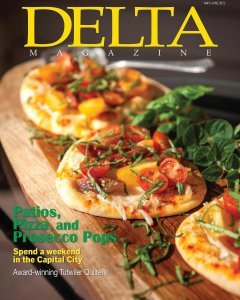
Hawk and jet vapor trail over the Mississippi Delta
By WILLIAM PRENTISS
I no longer have use for money, material possessions, or tangibles associated with not being in a presumed coma. It costs to keep me wherever Sis is keeping me and I am thankful resources exist for my care. I have not always wanted to live, not since the assault that reshaped my reality. Long having questioned God as to why this happened and why I am still alive, I often wonder if death would not be preferable.
I feel nothing, physically; yet my emotions and sensibilities have never been more fibrous, present, and keenly cognizant of self and its relationship to God—the only person who “hears” my silence. Like warm, running water on frostbitten fingers is God’s comforting ubiquity when I cry out to him with the only thing left beating and mobile—though unseen—my heart.
Today’s devotional, penned over 100 years ago, has Tolstoy ruminating on the dangers and inconstancies of wealth: Wherever your heart is, there will be your treasure. The heart of a person whose major treasure is wealth is buried in filth.
When Sis read this, I wondered if she was thinking about how I would respond if I were able to share my thoughts. She is well aware of how “unsuccessful” I was prior to my tragedy, the little money I accrued, and how I never stuck with any vocation long enough to acquire much regarding assets and reputation—too much attention deficit and instability.
This is an uncomfortable subject for internal deliberation, given my poor stewardship track record. Money was something I was not comfortable discussing. I never had much, knew I couldn’t take anything transient with me when I die; plus, copious possessions invite trouble, covetousness, taxes, maintenance, and a desire to amalgamate more.
I loved nice things and longed after amenities offering a more comfortable lifestyle; I just never wanted to work too hard for something that didn’t last. However, I never seemed to work very hard at things less temporal—friendships, service to others, meeting unique needs according to gifting. My hypocrisy knew no bounds.
The whole Western world seems eat up with compiling money, houses, cars, and gadgets. Keeping up with folks who have more than we do is sadly what drives too many of us. Envy is ugly; it is the polar opposite of thankfulness. If we are thankful then we are usually happy; if we are happy then we do not really need more stuff.
Tolstoy believed the intellectual life far superior to the material. For those who live a spiritual life, wealth is not only unnecessary but uncomfortable. It stops the development of one’s real life.
A significant downside for the proprietor of plenitude rests in the sentiment attached to abundance and its influence on actions toward others. A scripture from the book of Proverbs keeps my thoughts in balance:
Keep falsehood and lies far from me; give me neither poverty nor riches, but give me only my daily bread. Otherwise, I may have too much and disown you and say, ‘Who is the Lord?’ Or I may become poor and steal, and so dishonor the name of my God.
If Proverbs is to be regarded as trustworthy, then it is more detrimental to the soul to be rich than poor. Denying God is a more serious infraction than dishonoring him, but both are unacceptable for a professor of faith.
Being wealthy, a subjective term, is not inherently wrong; the rub is in how it affects the individual heart. Wealth as an appurtenance to an other’s-centered life is not displeasing to the Lord. It is the love of money that is the root of all sorts of evil, not the mere possession.
In a past life as a teacher I would begin each year by asking students if they would rather have a million dollars or be happy. They always took the cash. So would begin a Socratic discussion about what they would do with the money and what would be purchased. The conversation always ended up with the self-discovery that money was a means to an end—trying to purchase things to make themselves happy.
Tolstoy poisoned his dart with the following by Saint John Chrysostom: Is it true that people were created to collect more and more gold? No. God created people after His own image; He created you so that you could fulfill his will.
One recognizable hazard in possessing wealth rest in the oft-perceived belief one is self-sufficient and doesn’t need God and others. Another concerns the maintenance required to attend bounty: we are deterministically tied to what we possess.
Give and it shall be given; love and we will be loved; show mercy and we will be shown mercy; bless and we will be blessed. This is the image of God. Lord, help me not covet that which draws my attention away from what matters—relationship with You.
MORNINGS WITH TOLSTOY consists of the inner reflections of a man in a coma, the victim of a senseless beating. He can only hear, and no one knows this, but maybe his sister. Sis reads three devotional pieces daily and the internal dialogue reflects his response to them.
Mornings with Tolstoy – The Beginning
Mornings with Tolstoy – Day Two: And Goodness for All
Mornings with Tolstoy – Day Three: Focus on the present
Mornings with Tolstoy – Day Four: Pilgrims
Mornings with Tolstoy – Day Five: Fettered by Dysfunction
Mornings with Tolstoy – Day Six: Limitations of Pride and Selfishness
Mornings with Tolstoy – Day Seven: Empathy, Compassion and the Root of Both
Mornings with Tolstoy – Day Eight: Religion and Intellect
Mornings with Tolstoy – Day Nine: Conscience, God, Others, and Self
Mornings with Tolstoy – Day Ten: Wealth
Mornings with Tolstoy – Day Eleven: Where?
Mornings with Tolstoy – Day Twelve: Civilization and the Inner Self
Mornings with Tolstoy – Day Thirteen: Judgment, Intentions and Actions










Speak Your Mind